UCPI Daily Report, 5 Nov 2020
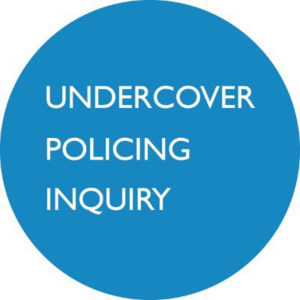 Tranche 1, Phase 1, Day 4
Tranche 1, Phase 1, Day 4
5 November 2020
Evidence from:
Rajiv Menon QC (Core Participants represented by Richard Parry and Jane Deighton)
Matthew Ryder QC (Core Participants represented by Mike Schwarz, Simon Creighton, Tamsin Allen & Jules Carey)
Donal O’Driscoll (Category L [Social and environmental activists] Core Participant, appearing in person)
Rajiv Menon QC
(Core Participants represented by Richard Parry and Jane Deighton)
Rajiv Menon QC speaking for some of the spied-on people, finished the statement he started yesterday.
He spoke of two people who were spied on during the very early years of the Special Demonstration Squad (SDS) 1968-72, the period that will be the focus of this phase of the hearings.
TARIQ ALI & ERNIE TATE
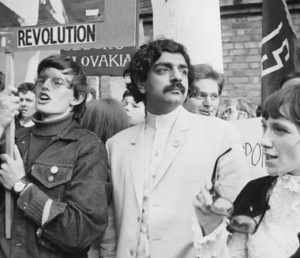
Tariq Ali
Tariq Ali, activist for over 50 years, will be the first to give witness evidence next week. Ernie Tate was due to give evidence but is now too ill. He is yet another victim of the delays to the Inquiry.
Tariq Ali was born in Punjab in colonial times and is now 76. He’s been in many political and campaigning organisations including the Vietnam Solidarity Campaign (VSC), International Marxist Group, and Stop the War. He has written more than a dozen books on history and politics. He was President of the Oxford Union in 1965 when Special Branch opened their file on him.
Ernie Tate was born in Northern Ireland. Tate was a founder of the original target of the SDS, the Vietnam Solidarity Campaign, and was on its national council until 1969 when he emigrated to Canada.
The fact that the VSC was an open, non-violent organisation did not stop it from being targeted. Tate was also a founder of the International Marxist Group where he became a friend of Tariq Ali. He’s said he’s always been open about his politics, so there was no need for subterfuge to reveal his views or activities.
In the VSC, Tate and Ali organised the 1968 demos against the Vietnam war that led to the foundation of the SDS.
Menon said that the Inquiry had viewed TV news reports of the March 1968 protest that ended in trouble, but the pro-police commentary is at odds with the visuals. Instead of steering the demonstration along its agreed route, police corralled the head of the march near the US Embassy. Police then failed to contain the crowd – who fanned out across the green – and the police ended up sending in the horses.
The injuries that were caused were the result of the police’s actions. The demonstrators were prevented from handing in a letter to the US embassy even though that had been agreed with the police in advance. This was all explained at a VSC press conference the following day.
It has become already become a oft-repeated fable at the Undercover Policing Inquiry hearings that trouble at the March 1968 demo was due to a failure of intelligence. This lie was the original sin that led to the founding of the SDS.
The lack of trouble at the subsequent VSC demonstration in October 1968 was claimed as a success by the new unit, but it was really due to better stewarding, and the intentions of the protesters. This is not mere speculation on our part, the press at the time reported this.
But credit was given where credit was not due. Commissioner Waldron gave a bottle of champagne to SDS officers.
A PERMANENT ARRANGEMENT
The SDS expected to be disbanded after the anti-war protest in October 1968, but MI5 saw the value of spycops having a permanent and much wider remit. The Home Office gave the scheme their blessing and successive governments provided funding year after year.
There should be no mistake. Whilst this squad was kept secret from the public, it was completely integrated into the established security apparatus of the British state, with a chain of command through the senior ranks of the police to the highest levels of government. Documents show the Prime Minister and Home Secretary expected advance reports on the Vietnam demos. The spycops were secret from the public but well known to government.
The SDS spread its attention to other ‘subversive’ groups. Police bragged that new entrants to groups were being identified and reported on within weeks. They were told to cast a wide net.
Their objective was to prevent positive social change, keep people in their places, and allow the established order to thrive.
If people are persuaded that socialism is a better alternative to rampant capitalism, should they not be allowed to exercise their democratic right to pursue such politics without being spied on? The State would say an unequivocal ‘no’.
The International Marxist Group grew to around a thousand members. Its office was burgled by the SDS after spycop ‘Dick Epps‘ was trusted with the keys and made copies.
Only one SDS officer, ‘Alan Nixon‘, admits to brief interactions with Tariq Ali. Ali wants to hear condemnation of the unwarranted spying, but expects instead to hear justification.
Ali is proud to be a revolutionary. He is a proud socialist for peace but is unashamed to say that violence is justifiable if, say, you are a Vietnamese person fighting invaders or a British soldier fighting the Nazis. This does not make him a valid target for spycops.
PIERS CORBYN
Piers Corbyn is in his 70s and still protesting. He has always been open about his politics and has nothing to hide. He attended VSC rallies in the late 1960s and joined the IMG in 1971. He also joined antifascist, Irish and trade union causes, but it seems squatting is what got him spied on.
Police claim they don’t know what cover name the relevant officer (code number HN338) used! Why was Corbyn asked about spycop Alan Nixon, yet officers aren’t asked about him? Corbyn can’t say how he was spied on because neither police nor the Inquiry will say who the spies were.
ADVISORY SERVICE FOR SQUATTERS
The Advisory Service for Squatters (ASS) has been advising people on housing rights since 1975 and has sold more than 150,000 copies of the Squatters Handbook since 1976. Squatting in residential buildings was criminalised in England and Wales in 2012, but ASS was spied on long before that.
Tenants and housing groups seem to have been spied on since at least 1971. SDS called squatting ‘the nursery of extremists’. The ASS say the state spying on them was indefensible. They have only been given two documents by the Inquiry and have no details of why or how they were spied on.
FRIENDS OF FREEDOM PRESS
Freedom Press is the largest anarchist publisher in the UK, and the oldest in the world. It was set up, with the blessing of William Morris, in the 19th century. It was constantly raided by police during world wars for producing Freedom anarchist newspaper.
Spycop Roger Pearce infiltrated Freedom Press from 1979 to 1984. He was actively involved, writing articles for them. Pearce later went on to manage the SDS (and write cheesy police-based novels). Another spycop, ‘Doug Edwards‘, also attended Freedom Press meetings.
Freedom Press’s headquarters was firebombed by fascists in 1993. Did spycops know about it? Did they know it was coming and decide not to stop it?
Freedom Press have had 11 intelligence reports from 1974-77. They have not been asked for a witness statement, nor been officially told which officers spied on them, so cannot possibly comment properly.
One stalwart Freedom Press member died last year, another person failed by Inquiry delays.
JUSTICE CAMPAIGNS
ROLAN ADAMS’S FAMILY
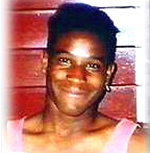
Rolan Adams
South London couple Richard and Audrey Adams’s oldest son Rolan was studious, about to take GCSEs, and a talented footballer scouted by West Ham, and also passionate about writing music.
In February 1991, racist attacks were on the rise in the area since the British National Party moved their headquarters to the area in 1989. One evening a gang of 12-15 racists chased and stabbed Rolan. His brother Nathan escaped and returned later to find Rolan dying. The gang called themselves Nazi Turnouts. Police knew who they were, and allowed them to walk free.
Neither the police nor the CPS admitted the crime was racist, an ongoing problem of British institutions dealing with such violence. They had a racist stereotype of there being no innocent black boys. Instead of being treated as a victim of crime, Nathan was instead harassed and criminalised by police, repeatedly arrested and searched.
The CPS frequently uses ‘joint enterprise’ against groups of people involved in a crime, yet didn’t prosecute any other attackers with murder. One attacker was sent to jail, and the judge asserted that the crime was indeed racially motivated.
Rolan’s parents started a campaign for justice. They made links with others in similar circumstances. Police were hostile to the campaign, intercepting people coming to the Adams’ house, clearly with advance knowledge of the visits. The family were being harassed but got no protection. They had to leave their home for their own safety three months after Rolan was killed. If police had focussed on the attackers rather than the family perhaps this could have been avoided.
The Adamses family are still angry and grieving. They are angry at the lack of charges, and at the culture of denial of the racist culture that led to Rolan’s murder. If police had taken decisive action, and used intelligence against racists rather than justice campaigns, perhaps they could have prevented later racist murders in the area. Instead, as racist murders rose, more young black men were arrested.
Richard Adams says the Inquiry appears to be a damage limitation exercise for spycops. There is no good reason for the ongoing refusal to live stream the future hearings. The family are cncerned that the Inquiry’s Chair, Sir John Moitting, is not assisted by a diverse panel. Whose side is the criminal justice system on?
DUWAYNE BROOKS
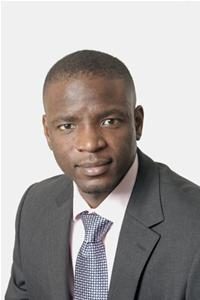
Duwayne Brooks
Duwayne Brooks was 18 in 1993, living in South East London, training to be an electrical engineer. Stephen Lawrence was his close friend. In April 1993 they were attacked by racists and Stephen was murdered.
His courage exposed the racist nature of the attack, yet police were hostile to him. Whistle-blower SDS officer Peter Francis has described combing through hours of footage of demonstrations and vigils to see if he could find something with which to charge Brooks.
It mirrored the Adamses’ experience; a racist attack with victims treated like criminals and subjected to spycops surveillance. Brooks did everything asked of him. He assisted three investigations. He gave evidence in court when medically unfit. Brooks has since helped numerous police bodies with their work on racism.
Despite – or because – of this, Brooks has been targeted by the police. He was prosecuted on trumped-up charges, a meeting with his lawyer was bugged by the Met, and he has had to face the truth trickling out over many long years. He has received more information than most about his spying, but has received nothing at all from this Inquiry.
Brooks won’t get to see the hearings via live-streaming. The Chair sits without a diverse panel to advise him.
When Brooks is given FULL disclosure he will address the Inquiry, but not before. He refuses to be treated like a suspect all over again, answering the Inquiry’s questions in advance, as if the burden is on him to establish that there was no good reason for the police spying on him.
KEN LIVINGSTONE
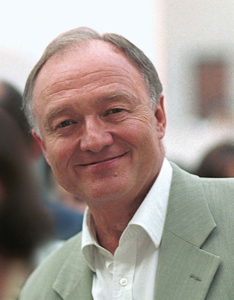
Ken Livingstone
Ken Livingstone led the Greater London Council (GLC) from 1981 until its abolition by Margaret Thatcher, but was active long before. He joined the Labour Party in 1969, and soon held office locally, focusing on housing issues.
Livingstone has received limited disclosure from the Inquiry, but has not been told why he was spied on. As soon as he was elected Leader of the GLC he faced relentless vilification from his opponents and in the press.
Special Branch had intelligence of threats to his safety. Having said there’d be no peace in Northern Ireland without a negotiated settlement, he was told that an Ulster Defence Association assassin had been sent to kill him but was called off at the last minute. Livingstone says this is an example of a legitimate use of undercover policing, dealing with a proscribed organisation involved in serious and violent crime.
After the GLC was abolished, Livingstone entered parliament in 1987, something he described as ‘like working in the Natural History Museum except not all the exhibits are stuffed’. Whistle-blower spycop Peter Francis named Livingstone as one of the people he knows was spied upon when they were an MP. Like the other spied-on MPs, he wants to see his file.
Livingstone has been involved in mainstream political life for 50 years, always in public. He can’t see any justification for targeting by spycops, either before or after he was elected.
WHY WERE THE SPYCOPS THERE?
The SDS was a weapon in the arsenal of the state from 1968-2008, with other units doing the same things after, to keep people in their place and allow the established order to thrive. Its unofficial motto was ‘by any means necessary’ but, to address a point made by the police lawyers, the ends DO NOT justify the means.
The victims of spycops aren’t just those who were spied on. In the broader sense, all who want to see an open, democratic, and fair society have suffered for what the spycops did.
We’re here to try to shine a light, let the world see into the dark den of police spies. We hope our participation will allow people to see at least a little of the truth.
In 1962, Martin Luther King said the guardians of the status quo are always on hand with oxygen tents to keep the old order alive. We hope the Undercover Policing Inquiry will not prove to be such a guardian.
The accompanying written opening statement from Rajiv Menon QC on behalf of the Core Participants represented by Richard Parry and Jane Deighton
Matthew Ryder QC
(Core Participants represented by Mike Schwarz, Simon Creighton, Tamsin Allen and Jules Carey)
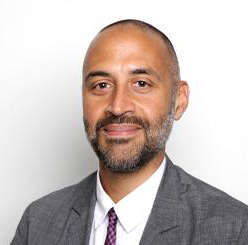
Matthew Ryder QC
Matthew Ryder QC speaks for lawyers representing the majority of non-state core participants, more than a hundred individuals and groups whose targeting by spycops was inappropriate, improperly regulated, and abused their rights. They were spied on over a period of more than 40 years, and range from community activists to a Peer who was once a Secretary of State. They all deserve answers. Officers must be called to account, as must the system that permitted it.
Spycops weren’t just out of control. They had political bias that affected the whole process. It included racial bias, and we expect an assiduous exploration of that in the Inquiry.
Spycops targeted many groups who did not seek to overthrow the ‘established democratic order’ unless we take it to mean basically any political or social change. It’s the antithesis of what political culture should be about.
SDS founder Conrad Dixon said a ‘firm line must be drawn between follower and leader’: that spycops mustn’t speak in public, take office, draw leaflets or anything else active in a campaign. These instructions were swiftly ignored. Spycops got deeply involved in stimulating the very groups they were meant to be surveilling, influencing the direction they took and the means of protest they employed.
We’ll never know the true cost of diverting and hindering the targeted campaigns. Voices that should have been amplified because their cause was right were selected for silencing. So many anti-racists, environmentalists and others who were spied on have been vindicated over the years by history and science.
Many were wrongfully convicted, encouraged into acts by spycops whose involvement hidden from the courts.
Most people who were spied on have not seen any documents from the Inquiry, which is a disgrace. Victims are keen to know the life-changing details that have been kept hidden for so long. They want fullest disclosure. They’ve had basically none so far.
Four of the people Ryder speaks for are in Tranche 1 of the Inquiry, which looks at 1968-82. Three of them were anti-apartheid campaigners. The fourth is Celia Stubbs, partner of Blair Peach, an anti-racist campaigner killed by police in 1979, who was spied on for her justice campaign.
ANTI-APARTHEID CAMPAIGNERS
Anti-apartheid campaigners opposed one of the most repulsive racist regimes of the 20th century. Yet the SDS targeted those who opposed apartheid, not its often-violent supporters.
The anti-apartheid movement was mentioned in the first annual report of the SDS. Black power groups were also of particular interest to the new unit. Sporting boycotts were a key part of protesting against apartheid, and were therefore targeted by spycops.
Three core participants – Ernest Rodker, Jonathan Rosenhead, and Peter Hain – were active in the Stop The Seventy Tour (STST) campaign opposing the all-white South African rugby and cricket teams. They made a real contribution to wider anti-racist movement.
Anti-apartheid campaigns helped to bring democracy to South Africa. In December 2015, STST’s role was recognised at the highest level by the South African government when they awarded Peter Hain the Tambo National Award in Silver for his excellent contribution to the freedom struggle.
Yet the police lawyer’s opening statement to the Inquiry this week talked of target groups having ‘totalitarian objectives’.
The three anti-apartheid campaigners were seemingly targeted by spycop Mike Ferguson, but we don’t know for sure because the Inquiry is protecting his identity even though he’s dead. As a Cabinet Minister in the 2000s, Peter Hain has been entrusted with the most serious secret information of state, yet is still not being told which spycops targeted him in his own home 50 years ago.
We do know that Mike Ferguson wasn’t a rogue officer. His colleagues knew about him and have testified about what he did. This wasn’t police using informants, this was police trying to take control of a political movement, a serving officer placed in the group to help direct activity.
We may yet hear explanations from police at the Inquiry. But it appears spycops retro-fit excuses for their surveillance. If there aren’t records to support a given justification the Inquiry should remain sceptical.
Ryder then spoke about some other core participants.
LONDON GREENPEACE
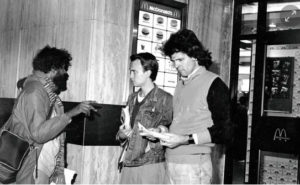
Bob Lambert handing out the McLibel leaflet, McDonald’s Oxford St, 1986
London Greenpeace (LGP) was founded in 1971 to encourage people to take action to preserve the ecosystem.
LGP initially promoted home composting, turning off lights not in use, putting bricks in cisterns to save water, and planting trees. It remained a small, leaderless group and encouraged others to create similar networks. A 1981 LGP leaflet describes itself as nonviolent and libertarian.
In the 1980s Bob Lambert infiltrated LGP. Lambert’s behaviour is truly shocking. He had multiple relationships with women he spied on including fathering a child. He encouraged activists to join actions, and even drove them there. He was still undercover in 1987 when fellow spycop John Dines joined the group.
Dines became LGP treasurer, gave lifts to members (in order to find out their addresses), and deceived one member, Helen Steel, into a long-term cohabiting relationship. Lambert deceived more than one woman into a relationship while he was in LGP. It was unjustifiable by any measure.
People who were part of LGP are concerned about spycops steering the direction of the group, including towards the anti-McDonald’s campaign, which Lambert vigorously encouraged.
The way intelligence was collected was a serious infringement of the subject’s life, and they have no idea what was gathered and how it was used. But we do know it was shared with private companies such as McDonald’s.
Some LGP members are on the construction industry blacklist despite never having worked in the industry. Were their details supplied by the spycops?
It can’t be claimed it was necessary for Lambert to infiltrate LGP to prevent serious crime, when Lambert himself admits they weren’t involved in any such activity. It was a violation of democratic rights.
Former SDS officer Peter Francis says that Lambert’s undercover career was ‘regarded as hands down the best tour of duty’ in the history of the unit. After his deployment he was promoted to running the SDS.
We don’t know which other officers infiltrated LGP, but a Cabinet report suggests it was being spied on in the late 1970s, long before Lambert arrived. So LGP calls for all files to be opened and all officers’ cover names published so those who were spied on can realise what happened and give evidence to the Inquiry.
RECLAIM THE STREETS
Reclaim The Streets was founded in the late 1990s to challenge the noise, pollution, and dominance of cars in our public spaces, and many of the group’s ideas have now been taken up across society. It shows the role of protest groups in inspiring progressive change in society.
Reclaim The Streets was infiltrated by spycops Jim Boyling, Jason Bishop and Jackie Anderson. There may well be others. During the infiltration, spycops were arrested and prosecuted under their false identities.
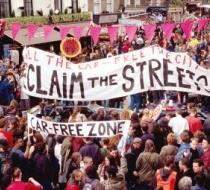
Reclaim the Streets, London 1995
Boyling was arrested for a protest in 1996 in support of striking tube workers, occupying the office of London Transport office. He and Bishop were both arrested on the Mayday 2000 anti-capitalist protest.
It appears Bob Lambert was Jim Boyling’s direct supervisor. Many of Lambert’s tactics in LGP were used by his charges: active involvement in steering campaigns, sharing intelligence with private firms, and abusing women.
Boyling had at least 3 relationships while undercover, with huge impact, and went on to have two children with Rosa. There can be no justification for this tactic. The fact that it echoes Lambert’s treatment of women shows it was institutional.
From 1999-2005, Bishop was very actively involved in campaigning against the DSEI arms fair. Again, this was a case of an undercover officer encouraging and steering a group.
ALDERMASTON WOMEN’S PEACE CAMP
For the last 35 years, Aldermaston Women’s Peace Camp (AWPC) has been based at the UK’s main nuclear weapons factory. It is a purely political campaign against militarism. It’s one of the few women-only protest spaces in the UK. Spycop Lynn Watson infiltrated AWPC in the years 2003-2004.
Lynn Watson was at Aldermaston at the same time as other groups, and we have to presume that she would have reported on them, espeically as she attempted to infiltrate some of then. However they have been refused core participant status at the public inquiry.
CLIMATE CAMP
In 2006, the first Climate Camp took place at Drax coal-fired power station in North Yorkshire.
There were further camps until 2010, all sited near high-carbon locations, such as power stations and airports, bringing hundreds of campaigners together to educate each other and protest.
Spycops officer Mark Kennedy was deeply involved in planning Climate Camp, attending five of them and being arrested twice. He was in the secret planning group that made the earliest and largest decisions about the Camps, as well as organising all logistics.
Spycop Lynn Watson also attended and helped organise the first Climate Camp, where she engaged in sexual activity with an activist. Like Kennedy, she was part of a secret group which organised the occupation of the site, and gave briefings to the group in her living room in Leeds.
DR HARRY HALPIN
Dr Harry Halpin is a global academic expert in infomatics who worked at MIT. He travels the world, giving talks to the likes the UN, the OECD and the European Parliament.
Halpin is also an environmentalist, who was spied on at the Kingsnorth and London Climate Camps in the late 2000s, since when he’s had repeated problems when travelling, including being detained under terrorism legislation.
It’s plain to see that Harry Halpin has been blacklisted for his environmentalism at events infiltrated and organised by British spycops.
CARDIFF ANARCHIST NETWORK
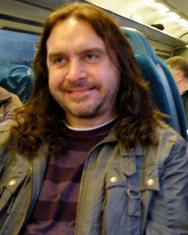
Mark ‘Marco’ Jacobs
Cardiff Anarchist Network was a group of about 20 people active from 2005 to 2010. The network consisted of autonomous collectives in opposition to all forms of exploitation and capitalism. Their campaign tactics included direct action.
It was infiltrated by spycop ‘Marco Jacobs’, who got involved in the group’s administrative tasks. He caused discord and fractiousness among the group, and deceived two women into relationships.
Jacobs formed close friendships, attending funerals of family members of the people he spied on. It was a gross invasion of their personal lives.
DEFEND THE RIGHT TO PROTEST
Defend The Right to Protest aimed to respond to the criminalisation of young protesters after the anti-cuts and student protests around 2010. It was an identified target of the National Domestic Extremism Unit. Spycop Simon Wellings was deployed 2001-07.
Wellings spent four years as part of the controlling group of Globalise Resistance. He outed himself by accidentally dialling one of the group while in a police meeting identifying the people he spied on, where he could be heard sharing personal information about activists in photographs he was showing to another officer.
MARK KENNEDY INCITING AND TRAVELLING
In 2009, spycop Mark Kennedy approached anti-militarist campaigner Kirk Jackson to organise UK activists going to Germany.
Jason Kirkpatrick was spied on by Kennedy on numerous occasions between 2005 and 2009, at his home in Berlin and in several other countries as he toured to give talks about protests against the G8 Summits. Politicians in some of these places – Germany, Ireland, Northern Ireland – have called for answers, but the Inquiry seems likely to disregard these as its remit only covers the spycops’ activities in England and Wales.
POLITICAL POLICING WITHOUT LIMITS
This was political policing. There was no constraint to comply with the law, not even the basic rights of those targeted. The Regulation of Investigatory Powers Act 2000 did not restrain spycops – we’ve seen how they carried on well into the 2000s.
The collection, retention and use of data is a major concern. This went on with no legal framework in mind. There was no meaningful system of oversight. Courts and prosecutors were deceived even as they carried out legal processes.
Senior officers either failed to control, or gave approval to, inexcusable acts. This continued for decades under various managers. It was institutional.
The Inquiry limiting access to data – and even the names used by the infiltrators – means victims are prevented from engaging meaningfully with the Inquiry meaningfully.
RACIAL JUSTICE CAMPAIGNS
Spycops targeted family justice campaigns and community organisations. The preponderance of black campaigns shows how their race was part of the threat they were seen to pose.
Celia Stubbs’s partner Blair Peach was killed by police in 1979. Lee Lawrence’s mother Cherry Groce was shot by police in 1985. Myrna Simpson’s daughter, Joy Gardner, died after restraint by police in 1993. Bernard Renwick’s brother died in 1999, again after being restrained.
Beyond those killed by police, Sukhdev and Tish Reel lost Ricky Reel after he was attacked by racists. Michael Menson died after being set alight by white youths.
Other core participants here are Winston Silcott, who was wrongly convicted of the murder of PC Blakelock, and Stafford Scott, who supported those arrested in the aftermath of the Broadwater Farm disturbances in 1985.
Sharon Grant’s late husband, MP Bernie Grant, supported many such campaigns, and was spied on. All these people were merely seeking justice over police malpractice.
CELIA STUBBS
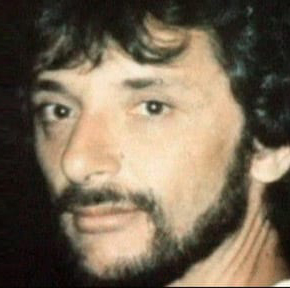
Blair Peach
Blair Peach was a teacher and trade unionist who attended a protest against the racist National Front in 1979.
Eleven witnesses saw six police get out of a van and one of them give Peach a fatal blow to the head. The determined cover-up that followed lasted decades. Police officers refused to answer questions. Commander Cass’ investigation said officers were ‘clearly obstructing’ the investigation.
Cass was clear that a police officer had killed Peach, but officers wanted to maintain the cover-up. All officers present claimed not to remember details. Cass’ report was kept from the inquest and went unpublished for 31 years, until 2010.
The coroner wrote to politicians before the inquest had even finished, saying the idea Peach was killed by police was a political lie. He therefore indicated to the Home Office that the investigation was biased. Blair’s partner, Celia Stubbs, knew none of this.
Stubbs says it can’t be expressed how exhausting it is to suffer bereavement then face such official intransigence. The guilty officer has been identified. Nobody has ever been charged.
Stubbs helped to establish Inquest for people in similar positions. Stubbs knew her phone was tapped but never suspected she was being spied on in person by undercover police. There would have been no justification for it. There were no secret meetings.
She finds it especially distressing that there was undercover reporting at Blair’s funeral.
Stubbs says spycops lost all sense of the fact that Blair was killed by police. His loved ones’ distress was criminalised. Stubbs has had no explanation for why she was spied on, nor why it was kept secret – no officer blew the whistle.
Spying on the Blair Peach campaign was a gross abuse of the trust given to police. They wanted to stay one step ahead of the campaign to assist the police in frustrating the attempts to secure accountability.
Stubbs got an apology from the police in 2015. It is not enough, it must just be a starting point.
The opening statement by police lawyer Oliver Sanders on Tuesday cited the deaths of Kevin Gately and Blair Peach. This was an offensive comment. Peach was not killed by protest or protesters. His killing does not stand as justification for spycops. Blair was killed BY police, and the truth covered up for decades.
What would have saved him was restraint of police brutality against a campaigner against racism. It’s an outrageous way to start the Inquiry.
LEE LAWRENCE
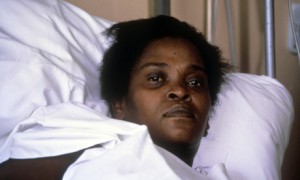
Cherry Groce
In 1985, Lee Lawrence saw his mother Cherry Groce shot by police at their home by Officer Lovelock. She used a wheelchair for the rest of their life.
In 2014, an inquest found that the shooting had contributed to her death.
Mr Lawrence has sat on advisory boards helping police improve tactics. His positive attitude has built bridges, yet he was spied on.
MYRNA SIMPSON
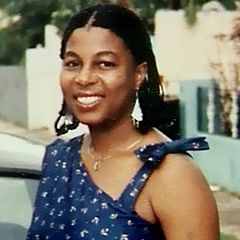
Joy Gardner
In 1993, Joy Gardner was at home with her three year old son when there was a raid by police and immigration. Her hands were bound to her sides, her legs strapped together, and 13 feet of tape was wrapped round her head. She was asphyxiated.
Three officers were acquitted of manslaughter.
Joy Garner’s mother Myrna Simpson was spied on by the SDS. We do not know why.
RICKY REEL
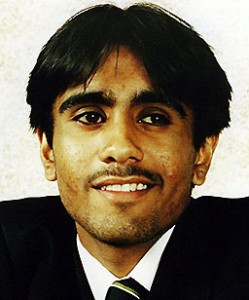
Lakhvinder ‘Ricky’ Reel
Ricky Reel’s family have been campaigning for an investigation into his racist murder in 1997, which police treated as an accident. The police investigation disregarded the racial harassment of Ricky Reel immediately prior to his death. They decided it was accidental death before the investigation was complete.
The police investigation was subject to two inquiries, but the reports are confidential. The family were told in 2013 that they had been spied on by the SDS.
For the Reel family to find out they were spied on on top of Ricky’s death and the failed police investigation has had a horrific impact. Resources weren’t available to investigate the death, but were available for spying on those who were left behind.
MICHAEL MENSON
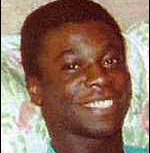
Michael Menson
On 21 January 1997, Michael Menson, a 30-year old black man, was discharged from hospital where he had received treatment for mental health matters. A week later he was found in the street, having been set alight. He was taken to hospital where he said he’d been attacked. He died of his injuries on 13 February 1997.
Police treated it as self-immolation; the family said it should be murder. The inquest ruled it an ‘unlawful killing’.
In 1999, three men were convicted of the murder in two separate trials. A Cambridgeshire police investigation found negligence and racism, with one police officer saying ‘I don’t know why they’re so worried, this only concerns a fucking black schizophrenic’.
Michael Menson’s family was told in 2014 that the SDS had spied on their campaign. They saw heavily redacted files. The family grieved for Michael, and were let down by the police investigation. To this day, they don’t know the full truth.
ROGER SYLVESTER
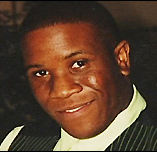
Roger Sylvester
On 11 January 1999, Roger Sylvester was acutely unwell with a mental health episode. He was taken away by police and was restrained in a way that killed him.
The inquest jury ruled it an unlawful killing, but this was overturned by the High Court.
Roger Sylvester’s family have seen redacted reports on the funeral. Why was that even reported on, and what was redacted?
WINSTON SILCOTT & BROADWATER FARM
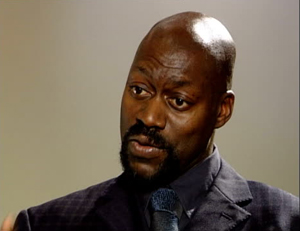
Winston Silcott
In October 1985, a few weeks after police shot Cherry Groce, police entered the North London home of Cynthia Jarrett, and she died from a heart attack. People on the Broadwater Farm estate felt unsafe in their own homes. A protest the next day developed into a disturbance, and PC Keith Blakelock was stabbed to death.
Winston Silcott was convicted of the murder, despite not even being at the scene. Officers had fabricated incriminating notes.
Spycop John Dines lived in a house overlooking the Silcott family home as Winston’s appeal was pending. Alcott’s conviction was quashed in 1991. He was spied on for up to ten years afterwards.
After the Broadwater Farm disturbance, Stafford Scott worked to support people arrested. Scott was arrested during the investigation into the death of Blakelock, and the police later had to compensate him for their mistreatment. He has devoted his life to supporting victims of police malpractice.
The Broadwater Farm Defence Campaign suffered a series of ‘burglaries’ and it is thought spycops are responsible. Spycop John Dines attended at least one protest in support of the Campaign.
HACKNEY COMMUNITY DEFENCE ASSOCIATION
Dr Graham Smith was part of the Hackney Community Defence Association in the 1980s and 90s, along with Mark Metcalf They supported victims of police brutality and abuses of power.
In 1993, Smith and Metcalf established the Colin Roach Centre, which hosted anti-racist, police accountability, civil rights and trade union activists. It too was burgled, and its computers destroyed.
In 1995, spycops officer Mark Jenner infiltrated the Colin Roach Centre. He became very active in it, including writing for its bulletin.
Jenner was privy to confidential information about cases against the police. He then turned his attention to trade union activity, even becoming chair of one group. He also deceived a woman known as Alison into a long-term relationship.
SHARON & BERNIE GRANT
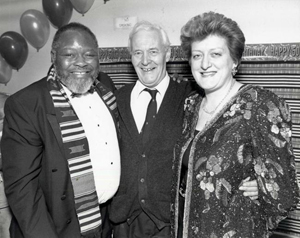
Bernie & Sharon Grant with Tony Benn, 1994
Sharon Grant is the widow of Bernie Grant, MP for Tottenham 1987-2000. In 1987, Bernie was one of three black MPs elected, the first time such a thing had happened in the UK. He supported some of the cases mentioned including the Broadwater Farm Defence Campaign. He challenged police stop and search practice, he opposed apartheid, and frequently travelled abroad for his anti-racist work.
As well as being Bernie’s wife, Sharon was his office manager and an activist in her own right. Was she also targeted by spycops? What justification was even given at the time for spying on an MP? Who else saw the intelligence – the press who vilified him?
DIANE ABBOTT
Diane Abbott was elected at the same time as Bernie Grant, the first black woman in the Commons. She’s been a leading anti racism campaigner for decades, supporting many campaigns including those of Blair Peach and Stephen Lawrence. Whistle-blower spycop Peter Francis says Abbott was spied on while an MP.
Joan Ruddock has supported many progressive causes and was an MP and minister. She too was spied on whilst an MP.
Unjustified, unregulated political policing like this distorts the ability of the public to engage with the political process.
None of these campaigns should have been spied on, nor the MPs. It wasn’t merely insensitive to grieving families. It was police shielding other officers from legitimate criticism and exposure of police wrongdoing.
The targeting of black campaigns and MPs mirrors the very complaints community campaigns were making. For simply seeking accountability by lawful means, they were subjected to the kind of intrusive spying people would think was reserved for serious and violent criminal activity.
Victims were treated as perpetrators. We want to know not just who did it, but who sanctioned it? What level approved or failed to prevent it?
This has a particularly disturbing aspect: unaccountable police undermining campaigns for police accountability. All the people I speak for, irrespective of their own ethnicity, want the Inquiry to be unflinching in exposing the racism of this policing.
MISCARRIAGES OF JUSTICE
Spycops took part in direct action protests and caused miscarriages of justice. They influenced and planned actions, including encouraging unlawful activity for which participants were convicted and even jailed. This was entrapment.
Managers who should have been providing oversight were tolerating, even encouraging this unlawful behaviour. Courts weren’t told. Proper disclosure and integrity of evidence were disregarded. It’s not only contempt for the spied-upon but for the legal process and rule of law .
Home Office guidance was clear – undercover officers mustn’t be agents provocateur, nor ever mislead a court [as cited in our post about spycops and miscarriages of justice]
The SDS Tradecraft Manual actively discouraged spycops from admitting their real identity to arresting police. Spycops arrested on protests were party to defence meetings with their lawyers, breaching legal privilege.
Spycop ‘Mike Scott‘ infiltrated a 1972 anti-apartheid demo, and was arrested and convicted under his fake identity. It is described here by one of those wrongly convicted, Professor Jonathan Rosenhead:
‘Mike Scott’ withheld evidence that exonerated the activists convicted – he knew they weren’t on a public highway as his uniformed colleagues had alleged. The spycops Tradecraft Manual itself warns of the risk of being ‘fitted up’ by uniformed officers.
ANDREW CLARKE & GEOFF SHEPPARD
Andrew Clarke and Geoff Sheppard were animal rights activists in the 1980s and 90s. Sheppard was convicted three times, and each a spycops officer was involved.
Clarke and Sheppard were convicted of planting incendiary devices intended to set off sprinklers in Debenham’s.
At their trial, Clarke and Sheppard had been convicted of joint enterprise, even though they may not have planted all the devices. There was no evidence of Clarke planting any. The Crown said a third person planted one.
In 2011, they found out the third person in their group, ‘Bob Robinson’, was actually spycop Bob Lambert, and appealed their convictions.
Clarke and Sheppard served long sentences. Lambert’s role was kept secret. He went on to run the SDS and get an MBE for services to policing.
Spycop John Dines was involved in Sheppard’s second conviction, when flour was thrown at a hunters’ ball. After that, spycop Matt Rayner encouraged Sheppard to acquire a shotgun, for which he was then convicted.
It seems that neither prosecutors nor the courts were aware of any spycops’ involvement. These officers had access to the defendants’ legal activity. This is secret police overriding the rule of law with nobody approving it but themselves.
Allegations of Bob Lambert’s involvement in the 1987 burning of Debenham’s in Harrow were first made in 2012. Four years later the Met said they were undertaking a criminal investigation. Four more years later, in October 2020, and the Met said they still haven’t finished their investigation.
STOP HUNTINGDON ANIMAL CRUELTY
Stop Huntingdon Animal Cruelty (SHAC) was a group campaigning to close Huntingdon Life Sciences vivisection labs. Several activists were convicted of blackmail in 2013. Numerous spycops, including Rod Richardson and Mark Kennedy, were involved, plus a corporate spy called Adrian Radford.
Spycops gave witness statements to court for Debbie Vincent’s trial, and we believe it happened in Stop Huntingdon Animal Cruelty trials as well.
JOHN JORDAN
John Jordan was convicted in 1997 for a Reclaim the Streets action – all other defendants including spycops officer Jim Boyling were acquitted.
Jordan’s conviction was quashed in 2014 but without disclosure of any evidence. The judge said it would come out at the current Inquiry.
RATCLIFFE CLIMATE TRIAL
In April 2009, 114 climate activists were arrested planning a protest to shut down Ratcliffe on Soar power station. Eventually, 26 were charged with conspiracy. In a first trial, 20 admitted the plan but said it was justified, and they were convicted in 2010.
In a second trial, six people denied being part of the conspiracy. Just before their trial began, they discovered that their fellow-arrestee ‘Mark Stone’ was actually spycop Mark Kennedy. They asked the prosecution to comply with their obligation to hand over all evidence, including Kennedy’s reports. On the day the trial was due to start in January 2011, the Crown Prosecution Service dropped all charges.
The Ratcliffe 20 then had their convictions quashed. The judge said future inquiries such as the current one would make everything clear.
DRAX CLIMATE TRIAL
A year before the Ratcliffe arrests, in 2008, 29 climate activists were arrested for stopping a coal train on its way to Drax coal-fired power station in North Yorkshire. The activists acted totally peacefully and with impeccable health and safety considerations. They were convicted.
After Mark Kennedy was unmasked, the Drax 29’s convictions were quashed. The judge suggested Kennedy was an agent provocateur.
GOOD EASTER HUNT SABOTEURS
In 1996, hunt saboteurs went to Good Easter in Essex. They were stopped and searched on the way, and several were arrested. In a similar instance nearby, another person was arrested after being stopped by police.
The police were extremely aggressive. This treatment of animal rights activists chimes with spycop Andy Coles’ contribution to the SDS Tradecraft Manual. In it, he told of the low opinion he’d developed of uniformed officers dealing with animal rights activists, saying it was ‘often out of proportion to your behaviour’.
Those arrested later received compensation. But one of the other ‘activists’ present was in fact a spycop, Jim Boyling. Boyling gave a witness statement about the police’s unlawful behaviour, but as this was believed to be coming from just another hunt sab, it carried no weight.
FAIRFORD COACHES
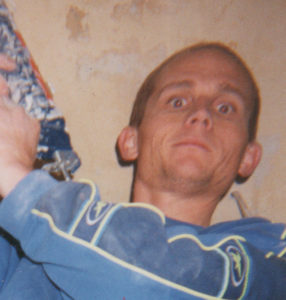
NPOIU officer known as Rod Richardson
Protesters travelling on coaches to RAF Fairford to protest against the start of the Iraq War were turned back by police, who then shut off all exits from the motorway to London. They said it was because a protester group known as WOMBLES were on the coaches, allegedly intent on disorder.
One of the passengers, Jane Laporte, brought a judicial review which found in her favour and against the police. This went to the High Court and House of Lords. Police had said they had ‘no basis for distinguishing between passengers’.
But spycop Rod Richardson was on one of the coaches. He knew who was on there, and their intentions. He would also have known who was and wasn’t in the WOMBLES. Spycop Jason Bishop had helped organise the coaches, and would also have known about the passengers.
Police misled the highest appeal court in the land, claiming not to have intelligence they clearly had.
LONDON ANIMAL ACTION
London Animal Action was a collective of animal rights groups founded in 1994. Numerous spycops joined; Andy Coles, Matt Rayner, Christine Green, Dave Evans, and possibly more. Bob Lambert was manager of some of these. All but Evans are known to have had intimate relationships with people they spied on.
We know corporate spies infiltrated London Animal Action. Did they get intelligence passed to them from spycops?
THE COMMON PLACE
In 2005, The Common Place social centre was founded in Leeds. Its first treasurer was spycop Lynn Watson. She complied with the legal obligation to file accounts – but did so under her false name. After she left and this was realised, the centre had to close.
HOW MANY MORE?
Mark Ellison and Alison Morgan’s 2015 report found spycops routinely withheld evidence from courts when they were involved in cases.
All spycops miscarriages of justice cases that have been reviewed have been the result of those convicted raising concerns, not from the police coming clean
Ellison & Morgan’s report also said that the lack of surviving records means we can’t tell what evidence once existed that would have changed court cases.
Ellison & Morgan identified 26 SDS officers arrested on 52 occasions. But it couldn’t identify all potential miscarriages of justice. This is extremely disturbing – the secrecy of the spycops means the facts of what they did were deliberately withheld from courts and some miscarriages of justice can never be rectified.
The refusal of police and the Inquiry to release documents, and pictures of spycops, are obstacles to discovering more.
Those spied upon, who have done better than police or CPS on this issue, must be given a central role at the Inquiry.
WHY WE NEED THE TRUTH
Core participants targeted by spycops are not confident the Inquiry will reach the truth. After years of asking, they’ve been told almost nothing. It makes it hard for them to properly contribute.
Speaking for the police at the Inquiry, Oliver Sands QC said criticism of spycops misses the point because if there were a right to be heard without the police knowing in advance, it would have to apply to everyone regardless of their politics, and that result in ‘pandemonium’.
We think the right to be heard without police knowing in advance is a human right of freedom of expression, it should not apply to those whose politics are deemed officially acceptable.
The behaviour of the spycops was consistent with what they were told was acceptable and encouraged to do; it was systemic, not rogue officers.
Exposing the truth about spycops has come at huge human cost. The spied-on did the work themselves to find out the truth, which is traumatic in itself. But it’s made harder because of the obstructions by police.
Had it been left to the police alone, we would never have heard of it. Discovering for themselves they have been spied on has had profound, long lasting and damaging impacts on the activists themselves.
One of the core participants who exposed Mark Kennedy said:
‘It was worse than a bereavement. When a loved one merely dies they go away forever but, unlike a spycop, they don’t undo all the shared experiences that made you love them when they were here. He should never have been in our lives and families. But more than that, we should not have had to find the truth for ourselves, and by chance…
‘But speaking to others who can’t be sure which of their friends were spycops, I realise I have been spared something even more damaging. The thing worse than knowing is not knowing.’
Undercover policing of this kind must never happen again. Even at this early stage of the inquiry, we should be looking for what changes the Inquiry will recommend for the future. We want to know what the purpose of the spying? Was it tainted by racism or other prejudices? Is the purpose a retrospective excuse that can’t be verified?
What framework did the spycops work to, and is there any evidence of it being adhered to? If it existed at all, why did it fail to protect victims?
The Inquiry itself is a test of whether an inquiry process can deliver justice and explanations to the wronged. It must deliver the truth we all deserve and have waited so long to hear.
The accompanying written opening statement from Matthew Ryder QC on behalf of the Core Participants represented by Mike Schwarz, Simon Creighton, Tamsin Allen and Jules Carey
Donal O’Driscoll
(Category L [Social and environmental activists] Core Participant
Donal is representing himself at the Inquiry. He was involved in numerous campaigns targeted by spycops, and is a researcher for the Undercover Research Group. This is a summarised version of his statement, you can read the full thing on their site.
It appears the Inquiry believes it can do its work without the non-state non-police core participants if needed, that it can interpret the moments and movements we were part of by hearing the words of those whose core training was to lie, people who were willing to pervert the course of justice.
Disclosure of material the police had years to pore over, we are given at the eleventh hour, with insufficient time to process properly.
Trauma, pain and injustice are at the heart of the matter. The undercover policing scandal has its impact because this is what it caused, in myriad different ways. People were abused. Democracy was attacked by ideologically motivated units, yet we are told they are the ones who need protecting with anonymity. The police committed serious crimes, and are clearly approaching the Inquiry as an adversarial process. The constant prioritising of police’s desires exacerbates the pain we all feel.
I’ve seen some of the information spycops police kept on us. I know how extensive, personal and vile it is, and the lies and inaccuracies within. The Inquiry will not get through the layers of deception where the police have covered their tracks, leaving documents that deliberately obscure the truth if they left any record at all.
I grew up in Northern Ireland aware of state sponsored murder gangs and shoot to kill policies. We knew what the British state is capable of and what it is willing to cover up or justify to itself.
So, I come to this with no illusions. However, I will not stand by when the Inquiry tells me it can get to the truth without letting me know the names of the undercovers who spied on me. When the Inquiry insists on withholding those basic facts from myself and others, it is not getting to the truth, it is helping cover it up.
In 1998, I was hospitalised, pushed under a moving car by a police officer during a demonstration, a deeply traumatising moment that still affects me. In the subsequent months I was targeted by police which furthered that trauma. I now believe spycop Christine Green would have been around for that. I want to know what reporting she and other undercovers made in relation to that period, and how that impacted on the civil claim I was then preparing against the police.
PERSONAL HISTORY
In the late 1990s I was placed on construction industry blacklisters The Consulting Association’s so-called ‘greenlist’ of environmental activists and experienced the impact of that, having job offers withdrawn last minute.
In the 2000s, I was involved in defending animal rights groups against civil injunctions that sought to undermining their right to protest. I now know that not only were the domestic extremism units overtly active around this, they were covertly active as well, including one corporate spy now known to have passed material to police. I want to know to what extent undercovers active at the time, at least one close to me, were disrupting our legal defences and who sanctioned that.
During one of the injunction cases, it emerged that Superintendent Stephen Pearl head of the National Extremism Tactical Coordination Unit (NETCU), a sister unit to the National Public Order Intelligence Unit (NPOIU), handed over to lawyers representing a number of private companies the names, details and convictions of 52 individuals including myself.
It was clear that this type of assistance was done as a matter of course and the practice only emerged when they sought to formalise it for proceedings. I managed to successfully intervene on that occasion, but the question remains as to how much other material, including that gathered by undercovers, was being passed over to private companies.
Superintendent Pearl went on to become a director of a vetting and security firm, Agenda. It raises the question of just how seriously should we take claims of risk facing NPIOU officers when, as of yesterday, he was listing his NETCU role and business interests on LinkedIn, along with a photograph of himself.
Around 2010, I was with Debbie Vincent talking to the pharmaceutical giant Novartis, negotiating in good faith regarding their injunction. However, we were not talking to Novartis as we’d been led to believe, but to undercover officer James Adams. I was arrested for conspiracy to blackmail, something I believe was done to undermine my work on the injunctions more generally. The charges were later dropped.
A PROUD ACTIVIST
I would like to make it clear that, as an animal rights activist, environmentalist, anarchist and anti-fascist, I remain proud of all I have been involved in and continue to be committed to those causes. I regret very little. I am sure the state will happily label me a criminal, but that does not bother me.
I have always fought for and been motivated by a sense of justice. It is at the core of who I am, that one does not stand idly by in the face of cruelty or oppression. Positive change comes only through people standing up to the powerful. I will not accept such criticism from a state that gives its agents, unchecked powers to abuse, rape, even murder, and will spend millions to cover for them. Whatever I have done that some might find disagreeable, it is nothing compared to the police.
In October 2010 I was among the first to get the phone call, a friend telling me they had just confirmed my friend Mark Stone was in fact the undercover Mark Kennedy. Over the next few months I watched the pain and tears. I watched good friends and colleagues being broken. I knew a number of those he had relationships with, and could only try to console them as they processed that horror.
In the last decade I have spoken to over 150 people who had been targeted, from all forms of campaigns and groups. Probably better than most, I know how far and deep the emotional scars of this scandal go.
Campaigning is hard enough, causes enough burnout and trauma in itself, without knowing there are those working alongside you to directly undermine all you are seeking to achieve.
It is apparent the undercovers had access to medical records and were willing to use health issues to facilitate access to people. They were close to people suffering serious medical trauma and inserting themselves in their lives and care.
SPYCOPS TRAUMATISING CHILDREN
In a number of cases, spycops were involved in the lives of children of activists. I have listened parents tell of the guilt at leaving their loved ones in the care of people who didn’t really exist, the doubt about their own judgement, and the anger toward the police that sanctioned this.
I’m also very aware of how much it impacted those children, some having to live with parents processing the trauma, others damaged by the knowledge that someone they thought was a friend was lying to them about everything.
Spycops pointed the fingers at other people, alleging them to be police or informers. How many people were wrongly accused in this way, effectively driven out and denied their ability to partake? This is a profoundly cynical, destructive and anti-democratic thing to do, and the interference with their rights should not be glossed over. None of any of these were one-off cases.
INSTITUTIONAL RESPONSIBILITY
The spycops units were not rogue. They were known of at the highest levels and their activities condoned. Many went on to senior management which tells us that knowledge permeated the police. Any investigation must find how far that knowledge went, but also how much there was wilful blindness to the abuses.
The police want to focus on the alleged criminality of protestors to justify the undercover deployments. But these units were ideologically motivated, individually and systemically racist and sexist, with little interest in the rights of those they targeted.
They didn’t send the officers in to tackle the alleged criminality of one or two people, they targeted groups wholesale for exercising their rights to protest and seeking positive social change. In doing so, they effectively criminalised these communities, and once that was accepted practice, it became reason enough to justify everything else.
The notion of “collateral intrusion” has no place in this Inquiry. These units saw nobody as collateral, but reported on everyone regardless.
Even if it management claim they did not know of individual abuses, they do not escape responsibility for creating a culture where anything went and they were content to fund it, and signed off on the choice of targets.
We know that undercovers and their managers went on to work for private firms, taking their knowledge and experience with them. In doing so they perpetuated the same intrusion and abuses they carried out as undercovers. It is not simply a matter of whether they worked undercover subsequently, but whether they also took information with them or used contacts back into Special Branch to obtain that information.
Ironically, many of the spycops make out it is they who are at risk. What they are most worried about is being held responsible. Hiding behind anonymity orders is a cowardly refusal to acknowledge they had no right to carry out their political, sexist, racist and anti-democratic policing.
There is no doubt it is still going on. We know domestic extremism units continue to exist and monitor protests to this day. The fact that they remain embedded in Counter Terrorism Command shows nothing has fundamentally changed in how they view campaigners.
Changing unit names has not altered the ideological foundation that gave rise to the abuses in the first place. These counter terrorism units are merely a rebranding of Special Branch while their Special Project Teams continue to deploy undercovers. The spycop scandal is not an issue of the past; it remains relevant right up the current moment.
People cannot and will not be fobbed off. Growing up aware of the injustice of the Widgery Tribunal’s whitewashing of the Bloody Sunday massacre in itself is, in part, is why I am here today. As with Shrewsbury, Orgreave, blacklisting, and so many family justice campaigns, the issue of spycops will not go away until answers are had, in public.
The accompanying written opening statement from Donal O’Driscoll, a Category L Core Participant
COPS will be live-tweeting all the Inquiry hearings, and producing daily reports like this one for the blog. They will be indexed on our UCPI Public Inquiry page.

One comment on “UCPI Daily Report, 5 Nov 2020”